Ratan Tata at the National Centre for Biological Sciences, Bengaluru, February 2002.
| Photo Credit: NCBS Archives
With the passing of Ratan Tata, we have lost—in addition to an industrial tycoon—a philanthropist who went for the long haul and was a calming influence amidst the turmoil and uncertainties of the everyday. At the Tata Institute of Fundamental Research (TIFR), we saw this in action over decades, beginning in the 1990s.

The TIFR was founded by Dr Homi Bhabha and is anchored in a tripartite agreement between the Dorabji Tata Trust, the Government of Maharashtra and the Government of India. The representatives of all three are on its Council of Management, with the chair usually from the Dorabji Tata Trust. Ratan Tata took on this position in the early 1990s, succeeding J. J. Bhabha (who briefly succeeded J. R. D. Tata). The Government of India almost entirely funds the TIFR through the Department of Atomic Energy. Therefore, it is unusual for the Chairmanship of the Council of Management to be assigned to the Tata Trust. This role involves tightrope walking of a kind where one false step can plunge the institution into an abyss of stasis at best, and deep crises at worst. Mr. Tata walked this path astutely for over 30 years, making sure and insisting on compliance with financial and administrative rules on one hand, yet demanding flexibility for science and encouraging ambition on the other. He was personally accessible to the TIFR Directors and Registrars—a requirement of his role—but he was also available on the phone or in-person to those in TIFR centres as they grew. In particular, Professors Govind Swarup (who established the Radio Astronomy programmes), Professor Obaid Siddiqi (who founded the National Centre for Biological Sciences; NCBS) and Professor B.M. Udgaonkar (who established the Homi Bhabha Center for Science Education) benefited greatly from these interactions. They went into meetings concerned, or even stressed, about a problem and came out reassured and optimistic. Stay calm, do not hurry, and do not waver from what you think is right, was his uniform advice.
The TIFR Council meeting held on November 15, 1995 was significant as it approved the creation of a separate faculty for NCBS, allowing it to function more autonomously while adhering to TIFR’s rules and bylaws. This meeting was part of the broader development efforts to strengthen NCBS as a research hub in the biological sciences under the TIFR umbrella.
Ratan Naval Tata (1937-2024): Life and times in pictures
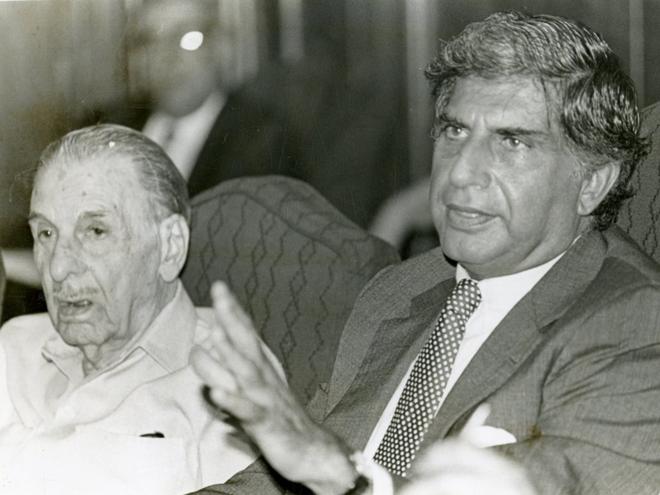
Ratan Tata became the chairman of Tata group in 1991. Tata received the baton J. R. D. Tata, his uncle, to an empire made-up of a disparate set of companies united only by name, literally.
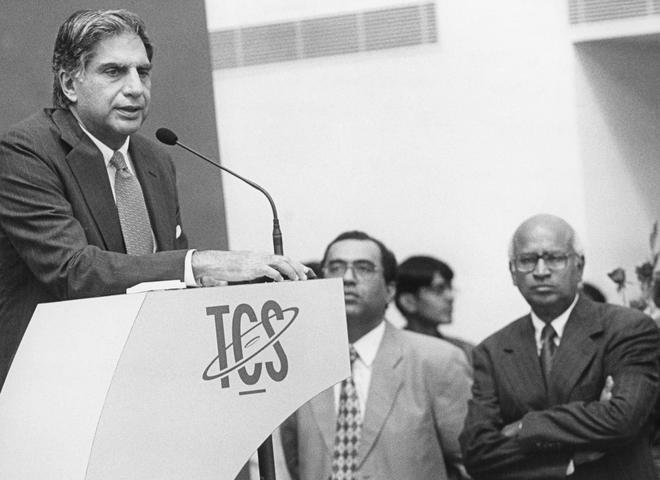
(From left) Ratan Tata, Chairman, Tata Sons with Executive Vice-President P. A. Vandrevala and CEO of TCS S. Ramadurai at the inauguration of TCS’ Sholinganallur facility
near Chennai on March 25, 1999.
Ratan Tata with K.B.Dadiseth, the then Director of Indian Hotels Company Limited in Mumbai on August 26, 2000. The IHCL is the holding company for Tatas hotel business, which includes flagship Taj and affordable Ginger Hotels.
Ratan Tata with former West Bengal Chief Minister and Communist veteran Jyoti Basu on August 30, 2000. The Tatas had big plans to manufacture their affordable car Nano in West Bengal’s Singur. However, it failed after massive protests on land acquisition. Tata Nano was eventually rolled out from Sanand in Gujarat, and the Left Front lost power in the State.
Ratan Tata with CEO N.srinath, CEO of Tata Internet Services Limited at a press conference to announce the launch of Tata Nova Internet Services in Mumbai on March 1, 2001. Poineers in all
The former Union Minister for tourism and culture Ananth Kumar and Ratan Tata, exchanging the MoU signed for the upgradation of facilities at the Taj Mahal in New Delhi on June 21, 2001.
Ratan Tata receiving the CSIR Diamond Jubilee Technology Award from the Prime Minister Manmohan Singh in New Delhi on September 13, 2004. Ratan Tata had shown his support to government when Manmohan Singh chaired as Prime Minister from 2004 to 2014.
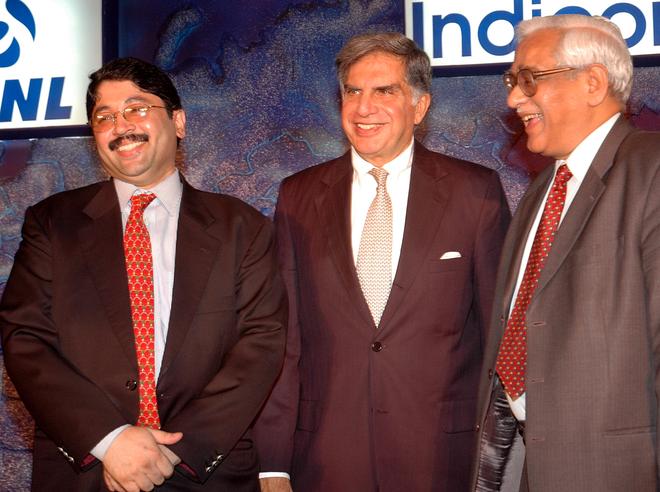
The former Union Minister for Information Technology and Communications Dayanidhi Maran (left), with Ratan Tata, and the Chairman of Videsh Sanchar Nigam Limited (VSNL) Subodh Bhargava (right), at the TGN – VSNL integration ceremony in New Delhi on July 28, 2005.
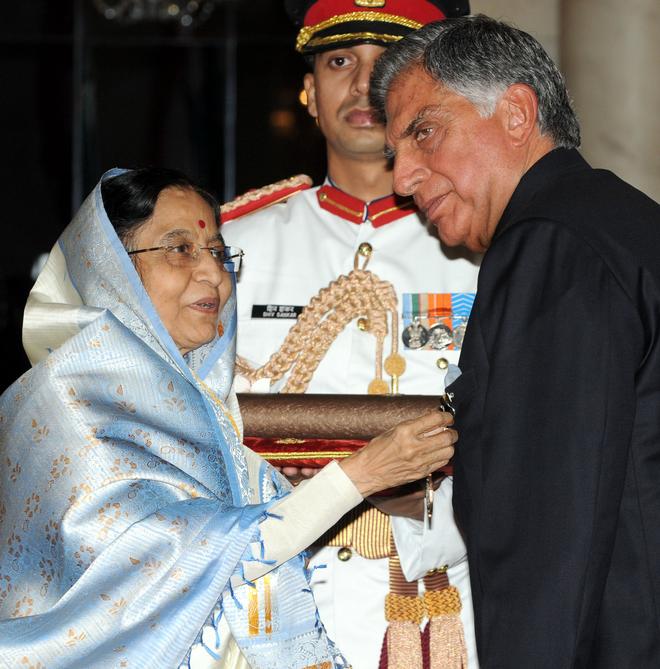
Former President Pratibha Patil presenting the Padma Vibhushan Award to Ratan Naval Tata during the presentation of Padma Awards at Rashtrapati Bhavan in New Delhi on May 10, 2008.

Ratan Tata, Chairman, Tata Motors, handing over the key of the first Nano car to Ashok Vichare and his family, in Mumbai on July 17, 2009. The Tata Nano, popularly called “1 lakh car”, was considered the “cheapest car”. It failed to impress the Indians and overall sales did not meet the expected target.
Ratan Tata group went in F/A 18 Super Hornet during the AERO INDIA 2011 at Yelahanka Airforce Station in Bangalore on February 10, 2011. Ratan Tata was a trained pilot and he had licenses to fly both jets and helicopters, showing his ever-growing passion towards aviation all his life.

Ratan Tata at the unveiling of world’s first ever gold jewellery car by Goldplus, a jewellery brand by Titan Industries in Mumbai on September 19, 2011.
Ratan Tata seen at the Jaguar stall at the Auto Expo 2012, in New Delhi on January 05, 2012. The Tata Group has scripted one of the most fabulous turnarounds in the auto industry and has been able to position the marquee British brands as formidable entities in the fiercely competitive global car market.
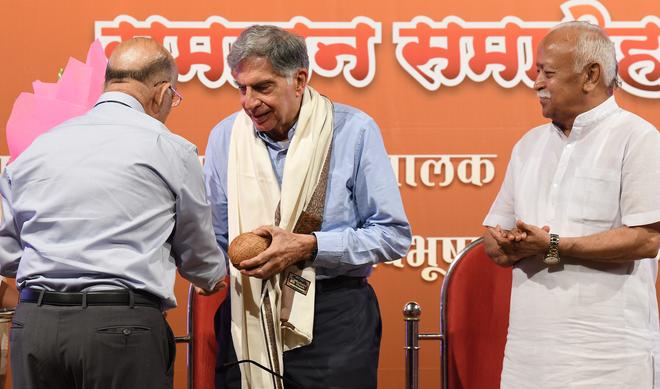
Ratan Tata being felicitated by Dr. Harshad Mangaldas Punjani while the Chief of and RSS Chief, Mohan Bhagwat applauds at an event organised by the Nana Palkar Smriti Samiti in Mumbai on August 24, 2018.
Tata first visited the RSS headquarters on December 28, 2016, his 79th birthday, while he was locked in a bitter boardroom battle with ousted Tata Group chairman Cyrus Mistry.
Prime Minister Narendra Modi greets Ratan Tata after his inaugural speech at 8th Global Summit in Gujarat on January 10, 2017. When Mr. Modi took over the rein in 2017, Ratan Tata was one of the business men to support the government. In 2015, Ratan Tata said, “there’s a great deal of hope in the inspirational leadership of Modi.”
Ratan Tata praying to Dwajasthambam at Tirumala temple on August 31, 2018
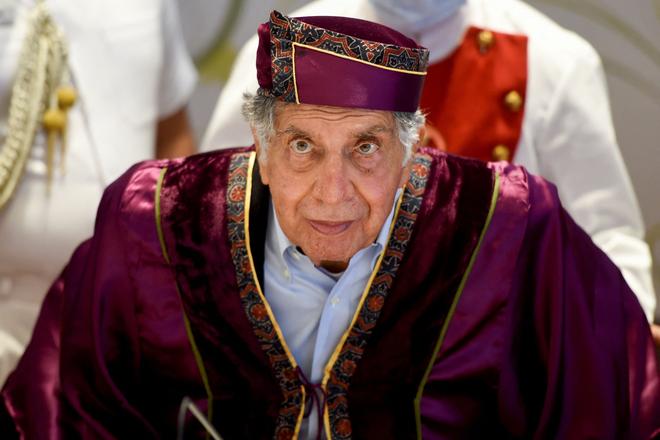
Indian industrialist Ratan Tata attends an event to receive a Doctor of Literature honorary title from the HSNC University in Mumbai on June 11, 2022. “The university believes that Ratan Tata reflects the philosophy of development, education and upliftment of all, which also resonates with the vision of HSNC University, Mumbai,” it said in a statement.

Ratan Tata’s love for pets, and particularly strays, extends far beyond the ones in the immediate vicinity of Bombay House. Legend has it that once Tata was moved to see a stray dog battling it out in the rain outside Bombay House, which led to the specific instruction on allowing full access to the premise for canines.
Industrialist Ratan Tata and Founder of Good Fellows Shantanu Naidu during the launch of India’s first companion start up for elders “Good fellows” at Taj President in Mumbai on August 16, 2022.
Policemen carry a coffin of the former chairman of Tata Group Ratan Tata before the funeral, in Mumbai on October 10, 2024.
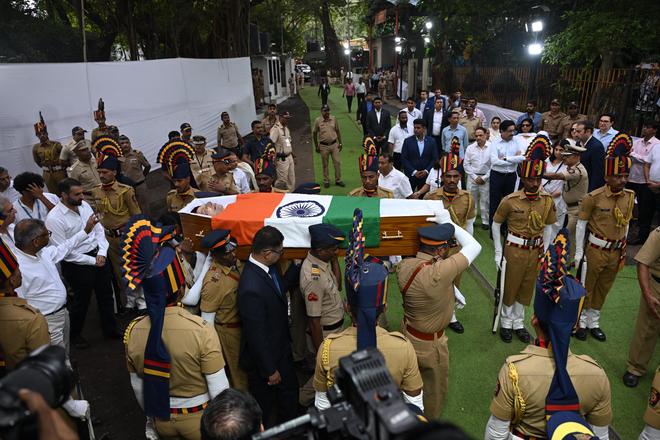
The immortal remains of Ratan Tata arrived at the Worli crematorium after the final procession on October 10, 2024.
1/3
In the 1990s, the TIFR Council began to have occasional meetings in Bangalore and Pune. A memorable one was in on 5 February 2002 when the Council dedicated the newly built campus of the NCBS-TIFR to the nation. Mr. Tata piloted his plane to Bangalore airport from Mumbai, stepped into a rather nondescript car the NCBS provided and spent a good half-day at the campus, visiting labs and meeting with scientists and staff. Later, he continued to take great interest in the growth of the campus. He—and the Department of Atomic Energy, then under the leadership of Dr Anil Kakodkar—enthusiastically approved the collaboration of NCBS with the Department of Biotechnology to establish the Institute of Stem Cell Science and Regenerative Medicine (no BRIC-inStem) on the campus. He often enquired about the progress of research through this collaboration.
More recently, Mr. Tata’s commitment to take the benefits of science to society led to the establishment of the Tata Institute of Genetics and Society (TIGS). The Bangalore Life Science campus now houses NCBS, BRIC-inStem, C-CAMP (a vibrant incubator) and TIGS. It is a powerful foundation that takes life sciences across scale from fundamental research to application. Just a few weeks ago, he had a meeting in Mumbai at his residence to put in place steps for the long-term sustenance and success of TIGS as part of the Bangalore Life Science campus.
Follow our LIVE coverage on Ratan Tata’s death
Ratan Tata was unflinchingly clear that focus, clarity and long-term commitment could be rewarding for the country and the world. But, paying attention to only the problems of the day and losing one’s purpose can sink even great people and institutions into mediocrity. Today, when we see the world around us, it is easy for even the greatest optimist to despair about what the future holds for our planet. When we see lives such as Ratan Tata’s, and when we imbibe and emulate his advice, we learn to unentangle complexity and pilot the future with confidence. The many across India who have inherited this spirit of realistic confidence with action, will remember him.
By Prof. K. Vijay Raghavan is a Professor and Former Director, NCBS, and former Principal Scientific Adviser to the Government of India.
Published – October 10, 2024 08:24 pm IST

